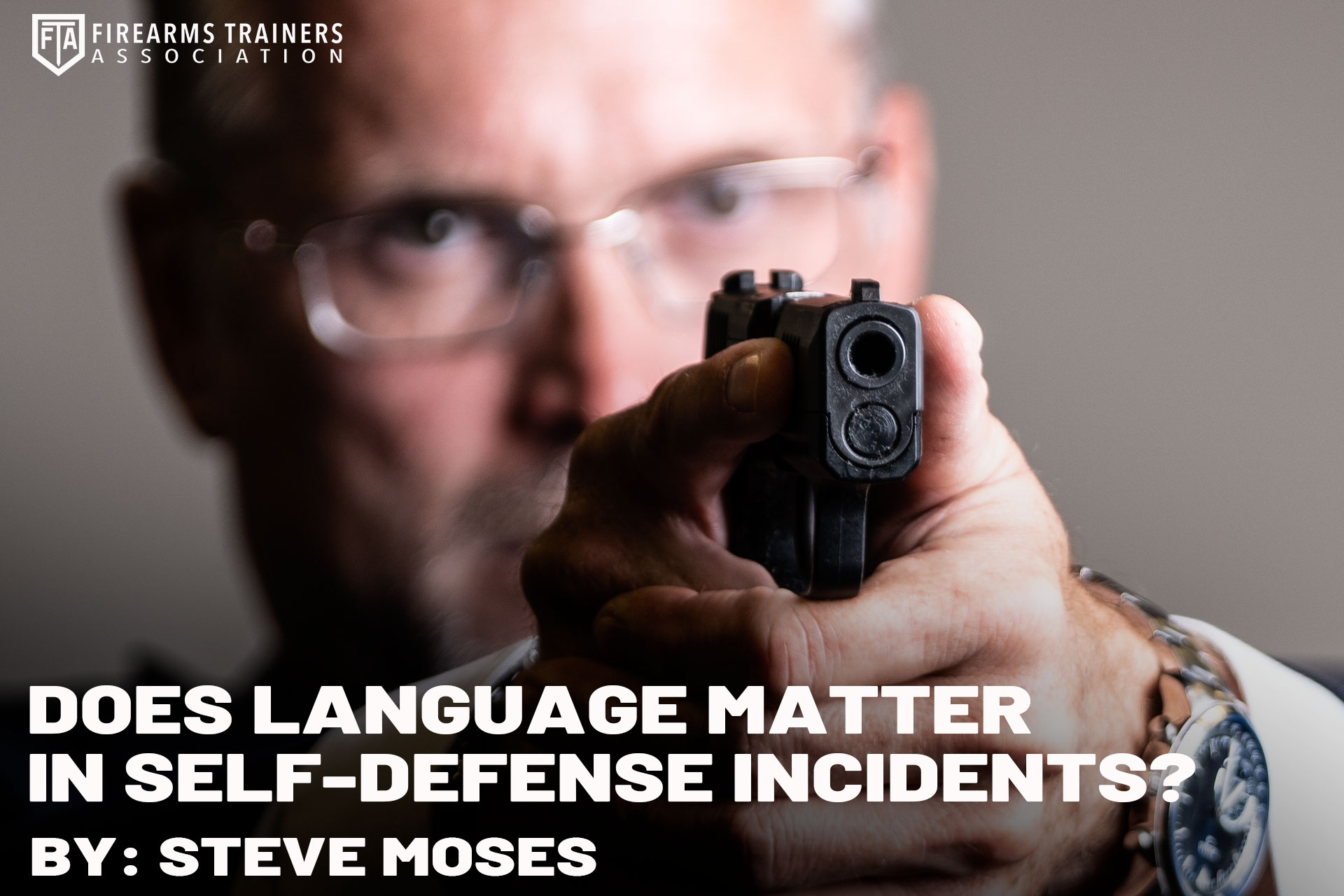
Posted on August 3, 2023 by Justin Collett in Steve Moses
Does Language Matter In Self-Defense Incidents?
My personal experience with potentially dangerous persons is limited to my capturing at gunpoint an intruder in my apartment during the nighttime while relatively young and hugely untrained, during forced entries with other deputies while performing Writs of Possession, performing a dozen or so arrests on bench warrants, watching other deputies interact with suspects refusing to immediately comply, and training obtained under such outstanding instructors such as Tom Givens, Craig Douglas, Paul Sharp, Cecil Burch, and others. While living for several years in downtown Dallas I had over thirty encounters with panhandlers and likely homeless persons.
While attending small or large training events in which there is a block of instruction on interacting with unknown, suspicious, or potentially dangerous contacts there is almost always at least one student that insists on yelling/screaming at the top of their voice to “get the (blank) back!” to a role player regardless of the scenario. This happened at a training event I hosted that took place in a Dallas, Texas hotel conference room. I immediately stopped the class and informed the attendees to lower their voices if they wanted to use profanity so that we did not get thrown out by hotel staff. Naturally, on the next evolution one of them did it again. I confronted this person who then explained to me that they had practiced it so much it was difficult to control. It was not my class, so I simply told the student that from that point on he just needed to use his “indoor” voice for the rest of the day.
Where am I going with this? It is possible that what we teach our students in our classes may become their only response to any encounter involving unknown, suspicious, or potentially dangerous contacts and result in an extremely negative outcome.
I have a good working knowledge of an argument between two armed concealed carriers that took place during a disagreement when one party said something to the effect that “I am getting the (blank) out of here ‘and the other competitor said: “What the (blank) did you just call me?” What struck me though was that even though the use of profanity by the first party was not personally directed at the second party, the second party apparently misheard it and as a result a prolonged exchange that could have turned out badly for both parties followed. I may be overthinking this, but I am wondering now if the following are possible negatives of using profanity during an encounter:
- Second party becomes offended because the profanity was directed personally at them.
- Second party becomes offended because they mistakenly believe that profanity was directed personally at them.
- Second party realizes that the profanity was not directed personally at them but uses it anyway as an excuse to escalate.
- Uninvolved third parties witness the confrontation and when questioned by responding law enforcement state that the first party started it by using profanity.
Confession: while holding the intruder at gunpoint all those years ago and waiting for the police to arrive much profanity was exchanged, and I was quite successful in convincing him that I was about to shoot him (the Ruger Security Six .357 Magnum I was aiming at his face may have played a part. I do not point my muzzle at anything or anyone anymore unless I intend to immediately shoot). I am very much aware that many violent criminal actors may have grown up around profanity and violence their entire lives. If they are facing someone whom they believe is uncomfortable with or reluctant to use profanity, they may also believe that the same person is mentally “soft” and reluctant to defend themself. The same may be true for persons whose cursing seems forced or awkward. I am pretty sure that it was Craig Douglas who said it was important for each concealed carrier to use language that was authentic to that individual.
Do I recommend using or not using profanity during encounters with potentially dangerous contacts? As for me, the answer is yes. My default script is pretty much as follows when it comes to dealing with encroaching persons whose intent is suspect. This is not true for persons whose actions would cause a reasonable person to believe that they were in immediate danger of serious bodily injury or death as well as certain forcible felonies such as kidnapping or sexual assault.
- Respectful tone: “Sorry, can’t help you” or “do you mind taking a step back?”
- Medium volume, increased intensity: “You need to stay back.”
- High volume, high intensity: “Stay back,” or medium volume, high intensity: “Stay the (blank) back.” In the event of the second option, it may be necessary to turn the volume up to maximum contingent upon the actions of the person regardless of the surrounding environment.
My thoughts are that as instructors it might be a good idea to drive the point home to our students that there is no one-size-fits-all solution when it comes to communicating with persons of questionable intent. I have always viewed verbal communication as simply another defensive tool not unlike unarmed combatives skills, OC/Pepper Spray/small knives/concealed handguns that I might need in order to successfully manage an encounter with others who may wish me harm and possess the ability and opportunity to do so. Inappropriate use of any one of those tools including what comes out of our mouths may result in arrest, crippling legal costs, incarceration, seriously injury, or death.